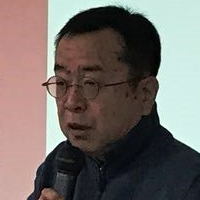
By Nobuhiro Katsurajima
Professor emeritus at Ritsumeikan University
As a person working in bilateral university exchanges
For 30 years, I have worked in exchange programs between Korean and Japanese academia and students. Since 2011, I have served as the Japanese head of the Campus Asia exchange curriculum involving Korean, Japanese and Chinese universities, an East Asian version of the European Union's Erasmus program, and promoted a "mobile campus" designed to transcend borders. As a Japanese officer in charge of Korea-Japan exchanges, I believe that the foundation of such exchanges should be based on a humble apology from Japan that requires its reflection on past wrongdoings such as invasions of Korea and China and human rights violations in both countries, and that students should jointly look back on such a historical background. Fortunately, students, who will lead the next generation, understand such a foundation well and are developing friendships with each other today.
The worsening relations between Korea and Japan began last year with the Korean Supreme Court ruling that ordered Nippon Steel, (formerly known as Nippon Steel and Sumimoto Metal Corp.) to pay reparations to the four plaintiffs who were former victims of forced labor. I have no choice but to say the fundamental reason for such conflict lies in the Japanese government's laziness in making a proper apology for the nation's previous wars of aggression and colonial rule. Tokyo insists that such issues were "settled" through the 1965 Korea-Japan Claims Settlement Agreement, but this accord did not rule out an individual's right to file a claim for damages. For example, Japanese construction company Kashima Corp. was ordered to pay reparations to Chinese victims of forced labor who had filed a lawsuit. Japan also acknowledged that Japanese victims who were mobilized for forced labor in Siberia had the individual right to seek damages from the Soviet Union. In addition, such treaties and agreements were signed despite numerous objections during the Cold War era, and the "compensation" paid under such treaties were related to the benefit of Japanese companies. This clear historical fact proves that Tokyo's arguments are groundless. Nonetheless, since the normalization of relations with Korea, the Japanese government has consistently refused to change its attitude of giving insufficient apologies and showing a lack of contrition for its colonial rule of the Korean Peninsula. My biggest fear is that such an attitude will greatly harm exchanges and trust between Koreans and Japanese.
The forced labor victims whom the Korean Supreme Court found in favor of were deceived by Japan and dispatched to Osaka when most of them were teenagers. At the time, they were told that they would learn skills in Japan and later be sent to steelworks in Korea to work. Instead, they were never paid and were forced to perform hard labor that risked their lives. Some of them said they tried to escape but were caught and beaten. Japan must start listening to what these victims say to make a proper apology and show contrition. Yet neither the Japanese government nor media has mentioned these victims. This is cause for major concern.
I am just a scholar specializing in the history of thought in Japan's Tokugawa period, not an expert in Korea-Japan relations. But before the era of modernization, both nations built bilateral relations based on good manners. Despite disagreements, the two sides worked to jointly resolve issues through good manners. They were wise enough to temporarily put off an issue that they failed to compromise on. This offers many lessons on mutual trust based on the basic universal values espoused by Zhuzi, a Chinese neo-Confucian philosopher, whose writings have been accepted by both Korea and Japan. Mutual trust laid the fundamental foundation for exchanges between Korea and Japan. If universal values today are said to mean the recognition of human rights without discrimination and peaceful international relations on that basis, an apology and contrition are due for Japan's colonial rule.
To cope with the latest situation, it is important to develop friendship and trust between the people of both countries, more importantly the students who will lead the next generation. Of course, both governments should go back to universal values and hold summit talks as soon as possible. Friendship and trust among the citizens and students of both sides are essential to fix Tokyo's rigid attitude. More active civic exchanges will help achieve a breakthrough in the ongoing situation at the grassroots level.
Nobuhiro Katsurajima is a historian and professor emeritus at Ritsumeikan University who specializes in the history of Tokugawa thought and the history of ideas. Having worked in academic and student exchanges between Korea and Japan for 30 years, he has since 2011 led the Japanese side in "Campus Asia," a program funded by governments designed to foster promising scholars in Asian humanities at universities in Korea, Japan and China.
Translated by Korea.net staff writer Yoon Sojung
Most popular
- Korea and Cambodia Launch First Article 6.2 Climate Project
- MOFA Spokesperson’s Statement on the Military Clash between Thailand and Cambodia
- Inargural Speech of the Minister of Health and Welfare
- Real Gross Domestic Product: Second Quarter of 2025 (Advance Estimate)
- Vice Minister Kim Jina Meets with U.S. Deputy Secretary of State for Management and Resources Michael Rigas
